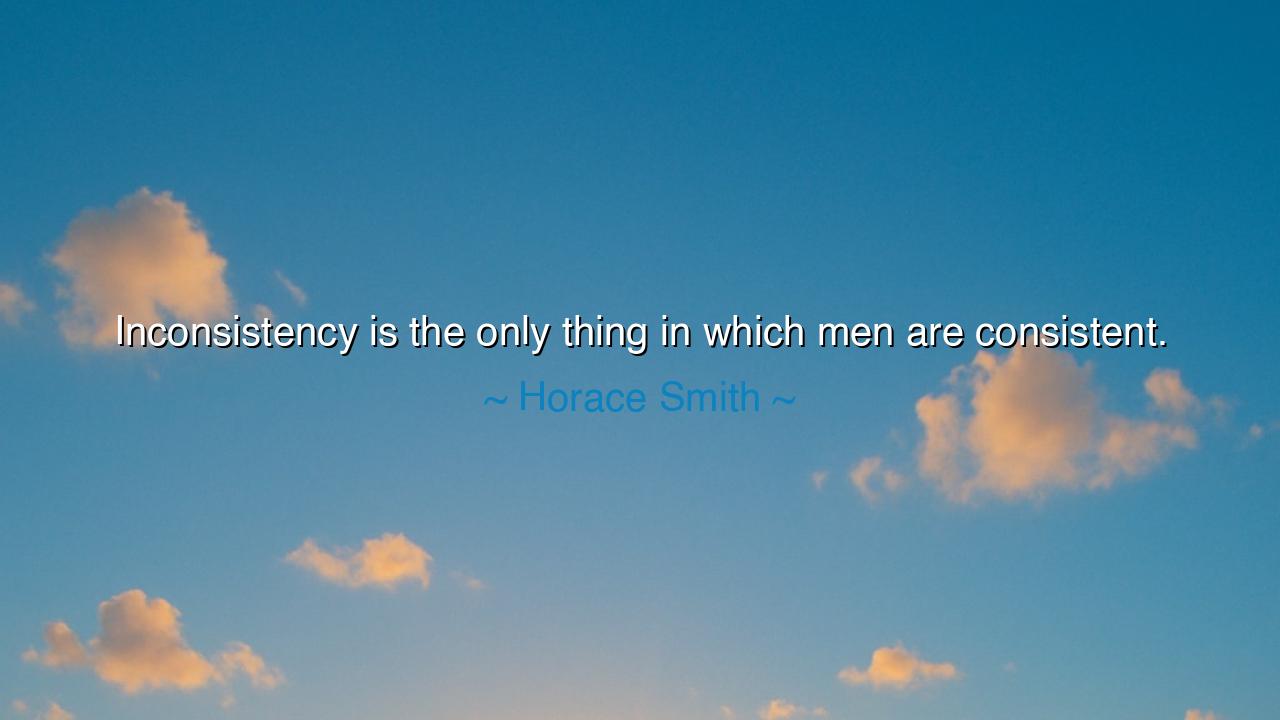
Inconsistency is the only thing in which men are consistent.






Hear now, O children of wisdom, the words of Horace Smith, a man whose sharp eye for human nature pierced through the veil of pretense and illusion. He spoke thus: "Inconsistency is the only thing in which men are consistent." These words, though simple, hold within them a profound understanding of the human condition — a reflection on the fragility of human nature, the chaos of the human heart, and the tendency of men to act in ways that are, at their core, contradictory. Smith speaks to the very essence of inconsistency that governs much of our lives, a paradox we cannot escape but must learn to understand.
In his statement, Smith draws attention to an uncomfortable truth: men are often driven by conflicting desires, impulses that are inconsistent with their own beliefs, goals, and actions. Though we may strive for stability, for clarity of purpose, we are often swept away by the currents of our emotions, our circumstances, and our fleeting whims. Our actions are unpredictable, and the promises we make to ourselves or to others are often broken by the very forces that we cannot control. It is in this very inconsistency, Smith argues, that we find the only true consistency within ourselves.
Consider, O children, the story of Julius Caesar, one of the greatest military leaders in history, whose ambition was as boundless as the Roman Empire itself. Caesar, at the height of his power, declared that he sought to bring peace and stability to Rome. And yet, in his rise to power, he undermined the very republic he claimed to protect, crossing the Rubicon and seizing power through civil war. His actions, though filled with ambition and brilliance, were inconsistent with the ideals he once espoused. Caesar was driven by a desire for control, yet his inconsistency — the tension between his public image and private desires — led him to actions that eventually brought his downfall. His story serves as a powerful reminder of how even the greatest of men are often governed by internal contradictions that shape their destiny.
The life of Napoleon Bonaparte, too, serves as a testament to this paradox. Napoleon, the great reformer, who rose from humble beginnings to become Emperor of France, proclaimed himself a champion of the French Revolution and its principles. Yet, in his pursuit of absolute power, he became a ruler who contradicted the very ideals of liberty, equality, and fraternity that had once fueled the revolution. In his desire to solidify his power, he crowned himself emperor, forever marking his reign with the inconsistencies between his actions and the revolutionary ideals he once claimed to embody. Napoleon’s story is a stark reminder of how deeply embedded inconsistency is within the heart of mankind.
This inconsistency is not reserved for the mighty alone. We, too, are guilty of this contradiction in our daily lives. We vow to live with discipline, yet we falter; we promise to remain steadfast, yet we are swayed by the slightest gust of emotion or circumstance. Our minds tell us to act with wisdom and patience, but our hearts often lead us astray, causing us to act impulsively or with regret. We dream of success, but at times we find ourselves surrendering to fear or self-doubt. In our deepest moments, we feel the friction between what we desire to be and what we are.
Yet, it is this very inconsistency that shapes the human experience. Inconsistency is not a flaw to be despised, but a characteristic of our humanity. It reminds us that we are not gods, but beings caught in the tide of our emotions, our circumstances, and our limited understanding. The recognition of our inconsistency allows us to grow in humility, to learn from our mistakes, and to embrace the fact that we are in constant flux. It is in the embrace of our contradictions that we find the path toward wisdom.
The lesson here, O children, is not to seek perfection, but to understand the nature of our own inconsistency. Rather than striving for an unattainable consistency, we must learn to navigate the contradictions within us. Live with awareness of your impulses, your desires, and the gaps between your intentions and actions. Recognize that we all, at times, act in ways that are inconsistent with our higher goals, and yet, it is this very tension that drives us toward greater self-understanding. Let this knowledge guide you to a life of compassion, both for yourself and others, knowing that imperfection is a shared burden, not a solitary one.
In every moment of inconsistency, there is an opportunity for growth. Accept the contradictions within you, and instead of railing against them, use them as stepping stones to greater self-mastery. In that space between our desires and actions, we find the possibility to transcend our own limitations, to evolve, and to become more than we were before. Through the wisdom of recognizing our inconsistency, we come closer to understanding the full complexity of what it means to be human.






AAdministratorAdministrator
Welcome, honored guests. Please leave a comment, we will respond soon